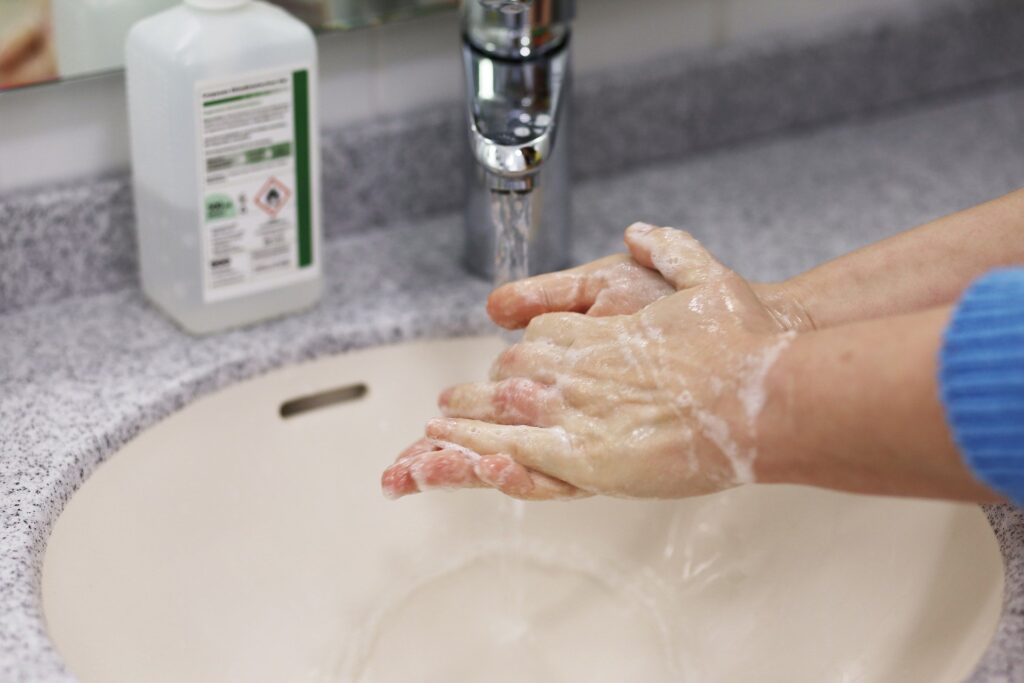A new USC survey offers a snapshot of how coronavirus has changed behavior in America, from stockpiling emergency supplies and food to hygiene.
Amid the rise of the coronavirus pandemic, many people in the United States perceive health and economic risks and are changing their behavior. That’s according to a new survey conducted by researchers at the Center for Economic and Social Research at the USC Dornsife College of Letters, Arts and Sciences and the USC Leonard D.Schaeffer Center for Health Policy and Economics.
The results so far show that people are bracing for the health and economic fallout of the pandemic: 12 percent of people said there was a relatively high — greater than 25 percent — chance they could lose their job, while 18 percent of people said there was a relatively high chance they could run out of money. Of those with jobs, 59 percent said they would have difficulty working from home.
The study was led by Daniel Bennett of USC Dornsife and Wändi Bruine de Bruin of the USC Price School of Public Policy. Bennett and Bruine de Bruin believe it may help public health and policy leaders identify gaps in information and understand how the virus has affected everyday life.
“The coronavirus is both a health threat and an economic threat,” said Bennett, a research assistant professor of economics at the Center for Economic and Social Research. “The social distancing measures that are needed to limit transmission will also cause a lot of hardship. Many people do not feel that they can work remotely.” Bennett is an economist who studies how people make health decisions, having previously studied the 2003 SARS epidemic.
Survey Says Coronavirus Changes Include Hygiene, Distancing, Even Prayer
Most but not all respondents reported taking actions to protect themselves. When asked what they have been doing in the last seven days to keep themselves safe from the coronavirus:
- 85 percent said they have been washing their hands or using hand sanitizer more frequently.
- 7 percent said they have worn a facemask.
- 61 percent of the sample reported engaging in various forms of social distancing; the most common strategy (practiced by 45 percent of people) was to avoid contact with high-risk individuals.
- 25 percent said they have avoided restaurants in general and 18 percent said they have specifically avoided Chinese restaurants.
- In a pattern that could have indirect health implications, 6 percent of respondents said they have canceled or postponed a medical appointment.
- 50 percent said they have prayed.
- 22 percent said they have been stockpiling food and water.
“It looks like most people are taking some action,” said Bruine de Bruin, Provost Professor of Public Policy, Psychology and Behavioral Science. “But not everyone is reporting that they are stepping up handwashing, which seems like a potential concern unless they were already perfect at it.” Bruine de Bruin is also a senior fellow at the USC Schaeffer Center, where she co-directs the behavioral sciences program.
The survey of 2,436 U.S. residents is among the first in the nation to examine the extent of Americans’ concerns about the outbreak. Early results from the survey, which was conducted from March 10-12, provide insights about the perceptions and experiences of U.S. residents as the coronavirus begins to spread in some communities. The survey was carried out as the World Health Organization declared the spread of coronavirus a pandemic and as celebrities and politicians shared that they had become infected.
The median survey respondent saw a 10 percent chance of catching the coronavirus. If infected, the median respondent perceived a 5 percent risk of dying. According to preliminary results, 1.6 percent of U.S. residents have at least one close friend or family member who has been infected with COVID-19.
About the survey: The sample of 2,436 U.S. residents participated March 10-12, 2020. The margin of sampling error is +/- 2 percentage points. The sample is preliminary, with full results to be released in the coming weeks. Survey respondents are members of USC Dornsife’s Center for Economic and Social Research’s Understanding America Study (UAS) probability-based internet panel. The survey was funded by USC. Information about the survey and the UAS panel, including methodology, question wording and results is available upon request to uas-l@usc.edu and will be posted online when the survey is complete.
